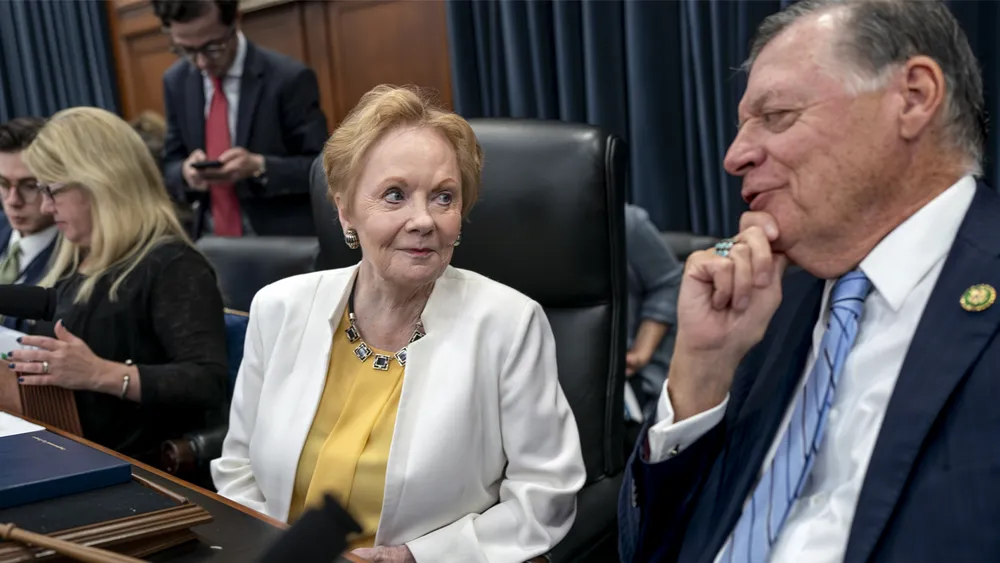
House Appropriations Committee Chair Kay Granger, R-Texas, speaks with House Rules Committee Chairman Rep. Tom Cole, R-Okla.. (AP Photo/J. Scott Applewhite)
As scientists warn of a mass extinction and ecological tipping points, congressional Republicans are helping their fossil fuel industry donors by quietly inserting provisions into annual spending bills designed to bar the American government from combating and researching climate change, according to the fine print of legislative text reviewed by The Lever. Some provisions also require the leasing of federal lands and waters for oil and gas development, while potentially limiting such leases for wind power.
In all, Republican leaders have added at least a dozen such environmental provisions to four annual government spending bills as property damage and death tolls mount from historic heat waves, floods, and wildfires.
By adding the provisions to annual must-pass spending bills, Republicans who control the U.S. House are attempting to force Senate Democrats to choose between either accepting them or blocking the spending bills and shutting down the government.
For his part, President Joe Biden has declined to issue a climate emergency declaration, which could provide his administration new authority to circumvent at least some of the Republicans’ tactics.
The GOP bills are currently in the House Appropriations Committee, chaired by Texas Republican Rep. Kay Granger, who has received nearly $1.2 million from the oil and gas sector over the course of her career in Congress. Her second-largest career campaign contributor is the oil and gas industry, and she brags on her government website that she has fought to prevent spending to combat climate change.
Granger’s congressional district has been grappling with a heat-related public health crisis.
Blocking Fisheries Research As Oceans Boil
One of the most aggressive Republican climate provisions moving through Granger’s panel is buried in legislation funding the government’s science agencies. As waters around South Florida set records for the hottest ocean temperatures ever recorded, a line in the bill would bar the Biden administration from spending any money on “climate change fisheries research.”
The move comes just weeks after tens of thousands of dead fish washed ashore in Texas due to high temperatures in the Gulf of Mexico, following other recent mass die-offs in Australia. The Center for Biological Diversity notes that intensifying ocean acidification triggered by climate change “could disrupt the entire marine ecosystem.”
The subcommittee that originally authored the fisheries legislation is headed by Republican Rep. Hal Rogers, who hails from the coal-rich state of Kentucky and whose top career campaign contributors include donors from the mining and fossil fuel industries.
Rogers has raised more than half a million dollars from the mining industry over the course of his career, and $390,000 from the oil and gas industry, according to data from OpenSecrets. In the 2019-2020 cycle, Rogers’s campaign paid $66,000 to his wife Cynthia.
The science funding bill also zeroes out funding for the U.S. Global Change Research Program at the National Science Foundation, which coordinates research across the federal government “to understand the human-caused and natural processes that influence our planet,” and would additionally block the government from using any funds to carry out climate-related Biden executive orders.
The bill targets a Biden order issued in January 2021 that directed the federal government to use the procurement process, in which it acquires goods and services from the private sector, to mitigate carbon emissions as part of a broader federal effort to address climate change.
The order also specifically directed the Commerce Department to “to collect input from fishermen, regional ocean councils, fishery management councils, scientists, and other stakeholders on how to make fisheries and protected resources more resilient to climate change, including changes in management and conservation measures, and improvements in science, monitoring, and cooperative research.”
The GOP legislation also moves to defund a separate Biden order from April 2022 that sought to enhance the federal government’s forest stewardship and promote “climate-smart stewardship of mature and old-growth forests.”

Watch The Lever
Make sure you’re subscribed to The Lever on YouTube to get our latest video reports and other special content.
Requiring Offshore Oil/Gas Leases, Slowing Wind Power Leases
The Republican spending bills contain several more efforts to undermine the Biden administration’s ability to meaningfully respond to the worsening global climate crisis.
That includes the bill authorizing funding for the Department of Interior, which oversees public lands. The legislation contains a provision mandating, “None of the funds made available by this act may be used to consider or incorporate the social cost of carbon.” The bill also permanently rescinds $1.3 billion in grant funding under the Clean Air Act to mitigate the effects of air pollution, as more than a quarter of all Americans now live in areas with dangerous levels of such pollution.
The Interior spending bill also includes provisions requiring “the Secretary of the Interior to conduct quarterly onshore oil and gas lease sales” as well as fossil fuel lease sales in the Gulf of Mexico, according to the bill report
At the same time, the legislation bars the government from issuing leases for offshore wind development in Florida until the completion of a study about windmills’ impact “on military readiness and training, marine environment and ecology, tourism, and other uses of the Outer Continental Shelf.”
The latter rider is in response to Florida Republican lawmakers’ complaint that “people travel from around the world to see our pristine beaches — not windmills.”
The Department of Interior funding bill has been spearheaded by Rep. Mike Simpson (R-Id.), who has received nearly $900,000 in campaign contributions from electric utility interests during the course of his career, as well as roughly $440,000 from oil and gas industry donors. In the last few years, climate-intensified wildfires have caused billions of damage in Simpson’s state.
Defunding Global Climate Investments
Then there’s the bill funding the Department of State and foreign aid. That legislation would bar funding for the Green Climate Fund — one of the entities charged with fulfilling the mandates of the Paris Climate Accords — which received a $1 billion deposit from the Biden administration in April.
Likewise, the bill prohibits the federal government from financing the Clean Technology Fund, which helps developing countries transition away from dirtier energy sources, and also explicitly rejects the concept of climate reparations, decreeing that none of the funds may be used “to pay compensation to any country, organization, or individual for loss and damages attributed to climate change.”
The bill also prevents the funding of an August 2021 Department of Treasuring guidance calling on multilateral development banks like the International Monetary Fund and World Bank to limit financing of fossil fuel projects.
The State Department and foreign aid bill is being overseen by Rep. Mario Diaz-Balart (R-Fla.), who has received nearly $430,000 in campaign contributions from the energy and natural resources industry during his time in office. His district includes locales that a recent climate study said are among the most likely to soon be underwater due to rising ocean levels.
The House bill for funding the Securities and Exchange Commission (SEC), meanwhile, seeks to bar the agency’s proposed climate disclosure rule, which would mandate that publicly traded companies provide a full disclosure of their climate risks.
The subcommittee overseeing the SEC bill is headed by Rep. Steve Womack (R-Ark.) who has received more than $175,000 from oil and gas interests during his career. Womack’s home state has recently experienced deadly tornadoes and flash flood warnings.
Finally, the GOP bill funding the Department of Labor will maintain a ban from 1976 that has been reapproved annually under both Republican and Democratic control of Congress that bars the Occupational Safety and Health Administration (OSHA) from investigating deaths at farms that employ less than 10 people, including deaths related to extreme heat. (Due to mass automation in the agriculture industry, this exemption includes many farms that are quite large and profitable.)
While OSHA has yet to issue a standard governing excessive heat in the workplace, the agency is tasked with investigating deaths or injuries in cases of extreme heat. At least 436 people died from extreme heat on the job from 2011 to 2021, according to the Bureau of Labor Statistics.
The OSHA bill originated in a subcommittee headed by Rep. Robert Aderholt (R-AL), whose top career campaign contributors include donors from agribusiness and the fossil fuel industry. Nearly a quarter of the Alabama labor force is outdoor workers, and the state recently experienced temperatures above 100 degrees.
The bills will now move to the full House for approval, and then the final bills must be negotiated with the Senate and passed again through both houses of Congress. If the provisions are kept in the text and Biden vetoes the spending bills, parts of the federal government could shut down.

Add new comment